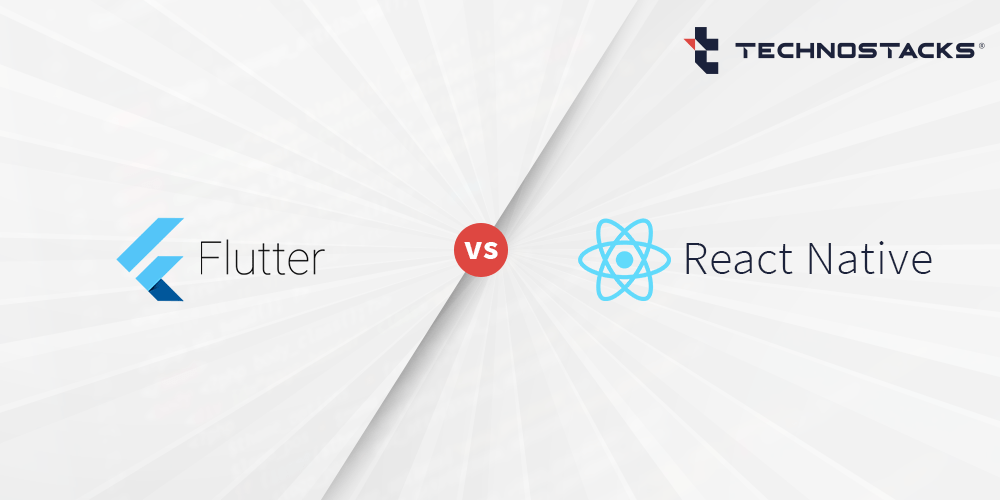Flutter vs React Native: Which is Best for App Development?
Have you been looking for the development of the apps quickly while reducing the cost with cross-platform development? But there may be the chance that you are unsure about the technology to choose.
When to choose React Native and When to choose Flutter? This article will compare the leading market players Flutter and React Native. In addition to that, you will be getting the idea regarding which one will be the best framework for fitting your app’s needs.
A detailed insight into the two platforms – Flutter and React Native
What is Flutter?
Flutter serves as a portable UI toolkit. Portable UI toolkit Flutter works with the comprehensive app Software Development Kit (SDK), which is well equipped with widgets and tools.
Flutter is the most suitable framework for cross-platform app development and gives developers an effective way to build and deploy natively-compiled, visually attractive applications for mobile (iOS, Android). In addition to that, it will also be the most suitable for web and desktop based on the use of a single codebase.
- Use cases of Flutter
Flutter is known for the development of Apps with material design as well as MVP mobile applications. Flutter framework finds use for Apps that function with OS-level features. Also, it has Advanced OS plugins with simple logic. - Popular apps made with Flutter as follows:Google Ads – Firebase AdMob plugins, Leveraged Dart packages, and static utility classes of Flutter providing a portable user experience in iOS and Android.
Tencent – Connected and shared device development for building a greater experience between users with multi-platform support.
Alibaba – Single-tap navigation experience will be applicable for all applications with the utilization of high FPS and a single codebase.
eBay – Complex and customized edge-powered AI features find the integration with Flutter and Firebase to create autoML.
BMW – High-performance user interfaces with the utilization of Flutter_bloc for management.
Reflectly – Migration from React Native to Flutter with the creation of the quality data events. The involvement of the StreamBuilder widget improves data synchronization.
Future of Flutter
These days more and more companies are getting attracted to Flutter. It has been witnessing monthly improvements, and the fame of Flutter SDK as well as Google continues to refine. The community has also been very enthusiastic and is actively taking part in the refinement of the knowledge base regarding Flutter.
Flutter is enabling the creation of not only mobile applications but also applications for the web. The support has also been made available as the beta release on the stable platform putting all the parts together. The future of Flutter looks quite promising for the toolkit.
What is React Native?
React Native serves as the open-source mobile application framework based on the use of JavaScript. React Native serves as the most effective framework for Cross-platform development. In addition to that, it is also suitable for building mobile apps using JavaScript language. Also, with React Native, you can just go with developing applications for Android and iOS using a single codebase.
- Use cases of React Native
Popular apps made with React Native are as follows:
Facebook – supercharged, supportive mobile UI involving simple navigation.
Walmart – The app holds the improved user experience with the involvement of smooth in-app animations.
Bloomberg – simple-to-access, personalized content involving the automatic code refreshing features.
Instagram – push notification as WebView without building navigation infrastructure.
SoundCloud – Made with the objective of bridging the time gap between updates and patched versions.
Future of React Native
Talking about the React Native, it can be said that Facebook is presently concentrating on the bigger scale Re-architecture of the expertise. The team from Facebook has been doing its best to improve the support for the React Native users. In addition to assisting its wider community in the community can also start with easily suggesting the changes to the Framework scored functionalities with the help of the RFC procedure that uses a dedicated GitHub Repo.
The actual results from the architecture are evident in the form that there has been the open-source JavaScript engine optimized for the mobile apps improving the time to interact and also lowering the app size. There will be possibilities for migrating React Native to Android X. you will get the opportunity for extracting the optional features as a part of the link or procedure.
The creation of an open environment for discussing the React Native turns out to be a significant step. It also works in the form of ongoing improvement as well as a signal for the Technologies’ bright future. React Native has acquired a stable position in the Marketplace and has also been on the trajectory of continuous development.
React Native vs. Flutter comparison: everything you need to know
Here is a detailed comparison of Flutter and React Native:
| Criterion | Flutter | React Native |
| What is it? | It serves in the form of the table UI toolkit for building the natively compiled apps across the mobile web as well as a desktop with the help of the single code base. | React Native serves in the form of the Framework for building the native applications with the utilization of React created by Facebook. |
| Free and open-source platform? | Yes | Yes |
| Official release date | May 2017 | March 2015 |
| Popularity level | 101K stars as per the regulations off GitHub Jan 2022 | 135K stars as per the estimates of GitHub Jan 2022 |
| Programming language | Dart | JavaScript |
| Availability of the hot reload option? | Yes | Yes |
| Native performance? | Great | Great |
| User interface | Flutter apps look good for the up-to-date operating systems as they are doing in the older versions with only one codebase. And so it happens that the apps look and behave similarly to that of iOS and Android.However, the material design and the Cupertino widgets are helping in imitating the platform design itself. But what is the method by which it is possible? Flutter contains the sets of widgets that will be confirming the material design widgets and will be implementing Google’s design language of the same name that is Cupertino widgets imitating the Apple iOS design.With that, we can say that the Flutter will be looking and behaving naturally on every platform and responsible for imitating the native components. | For React Native, we can say that application components are looking just like the native ones. For example, if you take a button on the iOS device, it will look just like the native iOS button, and it will be similar on Android.You need to know here that React Native always utilizes the native components Under the Hood, giving you the confidence that after any operating system UI update, the app’s components will be instantly updated to match your preferences.So, whenever you are wishing to get the app for looking near-identical across platforms in addition to the older versions of the operating system, then you will have to consider using 3rd party libraries. It will be helping you with the utilization of the material design components in place of the native phones. |
| Top apps made with the technology | Some of the top apps made using Flutter include the Hamilton app for Hamilton musical, Google ads app, my BMW. | Some of the top apps made using React Native include Instagram, Facebook, Facebook ads, Tesla, and Skype. |
| Highlight on sharing code | With Flutter, the date that has been announced is March 2021. It can be said that it has been using the same code base for shipping the native apps to the five operating systems, including Mac OS, IOS, Android, Windows, and LINUX.In addition to that, there has also been a boost to the web experiences targeting the browsers including Chrome, Firefox, Safari. That said, certified implementation with the Smart home applications makes it better. Progressive web apps are combining the Web’s reach with the capabilities of the desktop app.There is the availability of the single-page app that will be loading once and transmitting the data to and from the internet services. The existing mobile apps are also allowing the Flutter apps to just run on the desktop. | Talking about React Native, it can be said that it is limited to iOS and Android. But there are also selectable libraries allowing you to use the same code for building the iOS to Android.In addition to the Windows 10 applications, you can just go ahead with the extraction of a shared code in the mobile desktop as well as a web application for the separate repositories.It can be treated in the form of a separate project and then just injecting it in the same way as that of the other dependency. It allows a developer to focus on writing the code. |
| Time to market | The time that has been taken by Flutter is typically much faster compared to the native development. | Talking regarding the React Native, it can be said that it is possibly as fast as the development of the Flutter. However, there is a point that you need to note. React Native always utilizes the range of the native elements, so that may be the requirement of the separate Optimization for a free platform.This is a problem that the widget Flutter doesn’t Run into. It always makes the app development with the React Native longer. |
| Competitive advantage | The best part of Flutter is that it comes with a great look and feel because it has a range of rich features. It is also rapidly growing as a community with popularity.The excellent documentation, alongside the strong support from the team, is making it easy to start with the development of Flutter. Improvement of the Flutter for the web has been offering the potential for one codebase across the mobile and web platforms. | Talking about the React Native, it can be said that the stability has been around five years on the market. There are also many successful and prominent market players utilizing it. The React Native is also popular.The mature and vast community with easy-to-learn technology is making React Native one of the best technologies. There are plenty of tutorials and libraries that are making it easier to get the idea regarding quick and easy development. You can also use the code for both the web app and the desktop app development. |
| When is it not favourable to use? | Talking about the Flutter, we can say that it is not a good idea to utilize Flutter if the app needs the support of the 3D Touch because the Flutter isn’t supporting the 3D touch.But it has the features on the Flutter team’s long-term road map. In addition to that, when the design is platform-specific, we do not recommend using Flutter. When you see that your app requires multiple interactions with the operating system or there are little-known native libraries, we do not recommend utilizing Flutter.When you need the minimalistic UI but are relying on the significant use of the phone hardware, including the application that plays music or takes only pictures, it is not a good idea to utilize Flutter. When you want the creation of an instant app like a small-sized app, you shouldn’t rely on Flutter.
In case your app sounds like any of the above that we have mentioned it’s better that you should choose the native app development. |
Talking about the native react, we can say that if your app needs to handle ultra-specific tasks, including the calculations in the background, you should ntop-checklist-to-hire-python-developers-a-definitive-guideot utilize React Native. When you require custom communication with the help of Bluetooth, which can be tricky to do with React Native, you shouldn’t depend on React Native. When you want the app creation for android only, we do not recommend you rely upon React Native. The truth is that if you want to build an iOS app and you know JavaScript, then it is always the best idea to go for React Native.But in case you want the Android-only app, then it’s better to build natively with another team. Now you must know the reason behind that. Right now, iOS has better support compared to Android.In case the app sound like any of the points that we have mentioned above, it’s always a better idea to just go ahead with choosing native app development. |
Pros and cons of Flutter
Windows mobile has left the market a long time ago, leaving IOS and Android in the form of the two major platforms for mobile app development. Flutter UI development would have been designed for targeting both of the platforms since its inception in 2017. And so now we have the polished Framework that will be working with an impressive set of features and even more supported platforms.
So, let us understand what the advantages of the Flutter Framework are? Mobile devices are dominating our everyday lives. It doesn’t seem that Flutter is going to settle for the mobile. There has been global recognition. The development team is always looking forward to working hard to build the truly cross-platform Framework that covers Flutter embedded, Flutter desktop, and effectiveness.
Advantages of flutter
- Faster development and deployment
The built-in features like the hot reload make it one of the best platforms for compiling the code ahead of time and then displaying the active points before the project is rebuilt. After the minor code changes, the first development alongside the tool’s cross-platform nature is translating into the high speed to market. - Good quality documentation
This is an indispensable factor for the open-source project. The official Flutter.dev itself is enough for starting the building projects without prior Flutter experience. Any time some information on the tools is missing, the community starts closing the gap with the custom articles at the open repositories for the unique use cases. - Feature-rich user interface
The fully customizable user interface makes it one of the best. On top of that, every component comes out to be unlimited compatibility with the other devices. It is very comfortable and will be offering the proper functionality on the Android version starting from 5.1.1. In addition to that, it is applicable for iOS versions around 8 and higher than that. - Flutter UI separate from the native UI
Whenever the native visual component selection comes, the features will be failing to display completely, then it always ensures error-free performance. In addition to the unified view on the supported platforms, the best Flutter apps are inclusive of Definitely Google services like the Google ads and more than that.Now let us discuss the disadvantages of Flutter. We have already mentioned the powerful features of the Framework that has been listed, making it one of the best platforms for app development. But at the same time, you need to consider the disadvantages of the Flutter Framework.
Disadvantages of Flutter
- Age
Flutter is pretty young, and so it lacks the capability to come up with a variety of use cases. The team is also in the deepwater whenever it comes to the development of highly complex projects. - Dynamic evolution
It is not the definite disadvantage that we can say of the Framework, but rather it is behaving as a challenge. The frequent changes to the development environment mean that the product will be behaving differently from every major update. Sometimes it is also not expected or desired, so it is not a proper choice. - Project size
The stable, separate user interface always comes with a specific price. The project files occupy more space compared to the ones created with other tools. In this regard, it can be said that it will result in a major issue.
Pros and Cons of React Native
Perhaps React Native is already the best because it is finding the JavaScript development most efficiently. Considering it as the Global programming language, the native react has the best ratings. However, let’s discuss the advantages of the React Native Framework.
The acceptance of JavaScript has been giving plentiful plusses to the React Native app development as a comprehensive stuff. In addition to that, it is getting faster hiring, product release, easy maintenance, and more than that. The large open-source codebase has been evolving as the choice of one of the existing components to be used in a project platform.
Advantages of React Native
- Specific native components
React Native is a lot different now, and it is doing so in a good way from the other JS-based Framework. Comparing the React Native versus The Angular JS, we can say that the React Native always acknowledges the importance of platform-specific native components. In contrast, the others ignore them and rely on ionic tools. - Popularity
JavaScript has been used as one of the developers’ most widely popular programming languages. It has also come up as the third most popular language. The talent pool has also been vastly relying on it. - Web and react XP libraries
React Native for the web and react XP libraries are in addition to the Framework. When you are considering launching the web version of the given app performance with the native rebuilt apps, it is surprising that React Native has been setting the Benchmarks regarding how it is better over many others, especially Swift for iOS. - Hot reload
The Hot reload option is available and keeps away the headaches for the developers allowing them to just go ahead with watching the changes without the project rebuild option. Now we have already discussed some of the good sides of React Native. Now let’s discuss the disadvantages.
Disadvantages of React Native
It’s worth noting that no tool is perfect in cross-platform development, and React Native has its limitations as well.
- Poor documentation
The framework has a single central base of knowledge, just like Flutter. The proponents of the React Native admit that the documentation could have been a better one. - Lots of connectable native libraries
There are lots of connectable native libraries. This fact is a dramatic point. Sometimes there may not be fit options for the implementation of the functionality of your project. Some readily available components require to be changed, and some need to be discarded right from scratch. - Partial independence
All the class frameworks are meant to be platform agnostic. But it can be said that it is impossible within React Native development. React Native has been seeking to acknowledge the differences of the platforms, and the team requests to rely on the expertise of the native developer for implementation of the best practices.
Which to choose? Flutter or React Native?
First of all, information about the frameworks is occupying the same domain in software development and has been sharing several general features. Both are good for building the cross-platform MVP with the possibility for literally using the code and extending it with the free community. However, when there is a need to get ahead with the app development, it’s good to note certain points.
- Flutter versus React Native platform support
The factors target not only web and mobile but also the embedded systems and the desktop. It is very useful whenever it comes to app design. There is a possibility for comfortably accessing any device, including the tablet, phone, or laptop for the vehicle infotainment system screen. - Performance standards
Flutter projects comply with the native code resulting in overall better performance. It also runs into performance issues whenever the particular graphics routine is not optimized from time to time. - Ease of use
JavaScript developers (web front or back end) have reported that it is always easier to learn React Native but requires the knowledge of dart programming language. - Project size
The React Native project proves to be more lightweight. It may not look like that of a big advantage. But thinking about miniature wearable devices, one needs to be mindful regarding the free space usage.
Flutter vs React Native: The choice of the one for your app
Both the frameworks are relatively young, and so you can choose anyone based on your preferences as well as your app’s needs. In both cases, you should know the pros and cons of both the platforms and the one that will match your project needs.
We can say that you should choose Flutter by keeping in mind that the app will be given a heavy load on the GPU and CPU. The user interface will also require a lot of detailed customization. There may be a chance that the app will be going beyond mobile on the next step. You will benefit from the experience of the current team. It is fit for the development of variable and embedded systems, including the PC. There are several use cases that support the fact that you should choose Flutter.
We will suggest that it is a good idea to choose React Native when you keep in mind that the app will utilize the visual representations or user interface. Also, there is a need to consider the native components exclusively. See that the development team of choice is also fluent in JS, React Native, react. Only then should you assign the project to them. The app should be considered in the form of a relatively simple stick and lightweight app. the app should also be web-based and mobile.
FAQs About Flutter vs React Native
Q1) What is the main difference between Flutter and React Native?
The difference lies majorly in the Concept. Documentation standards suggest that Flutter documentation is good, organized, and more informative. The best part is that it lets you get everything that you want to be written in one place. React Native documentation, on the other hand, can be considered as user-friendly but disorganized.
Q2) Flutter vs. React Native: Which one to pick in the year 2022?
It’s worth noting that React Native relies on third-party libraries for accessing most of its native modules. On the other hand, the Flutter framework comprises UI rendering elements and APIs that guarantee device access, navigation, and testing. That said, Flutter guarantees a better user interface; choose Flutter.
Q3) Is React Native suitable for building large-scale apps?
You can create small scale applications and prototypes using React Native. It would be a good choice for quickly creating a prototype that works both on Android and iOS.
Q4) Is Flutter faster than React Native?
By sticking to the performance metrics, it can be said that Flutter is the clear winner as it is much faster than React Native. But it’s worth noting that you can easily share code with React Native.
Q5) How simple is it to implement testing in Flutter?
It is quite simple as you need to set up your Flutter environment. After that, you will have to build the app. Unit testing the provider, Widget testing as well as testing app UI, and conducting the performance with integration tests are the necessary steps.
Q6) Is React Native better than Native?
Compared to Native technology, React Native provides a wider set of opportunities for processing higher work in an application and launching higher-functionality updates. React Native offers to reuse and share the code between iOS and Android. This makes the development process faster and also needs less resources.
Q7) Which framework is to be used for the fixed budget application? Flutter or React Native?
Flutter is better for performance, engineering cost, compatibility & app features. However, React Native is better in the way it directly influences the developers.
Q8) Is React Native a great choice for specific app development timelines?
Yes, React Native is a great choice for specific app development timelines. You can feel the goodness of high performance and powerful platform-specific features.
Q9) Should I learn Flutter or React Native in 2022?
Larger applications that require native programming should consider Flutter as a suitable option. React Native is the perfect fit for the applications that develop from plug-and-play modules.
Q10) Which is easier: React Native or Flutter?
React Native is more popular among the junior generation of developers. Scaling the Flutter framework is challenging.
Key Takeaways
We’ve discussed the difference between Flutter and React Native. It’s worth understanding that every application is different, and so there is no need for consideration of the merits and demerits of both the frameworks alongside understanding the cross-platform development. Always discuss the project with an experienced team of developers who will be helping you in understanding the different approaches and the one that will be suitable for your team.
Hire React Native developers or Flutter app developers based on your project needs. Always take the confidence that both Flutter and React Native are good technologies, but the one that you should choose will be completely dependent on the project. Each of the Frameworks will be assisting you a lot in spreading the applications wings and Fly. Keep your fingers crossed and let the Framework do the necessities for you.








